The EVGA X570 Dark Motherboard Review: A Dark Beast For Ryzen
by Gavin Bonshor on October 8, 2021 8:00 AM ESTCPU Performance, Short Form
For our motherboard reviews, we use our short form testing method. These tests usually focus on if a motherboard is using MultiCore Turbo (the feature used to have maximum turbo on at all times, giving a frequency advantage), or if there are slight gains to be had from tweaking the firmware. We put the memory settings at the CPU manufacturers suggested frequency, making it very easy to see which motherboards have MCT enabled by default.
Rendering - Blender 2.79b: 3D Creation Suite - link
A high profile rendering tool, Blender is open-source allowing for massive amounts of configurability, and is used by a number of high-profile animation studios worldwide. The organization recently released a Blender benchmark package, a couple of weeks after we had narrowed our Blender test for our new suite, however their test can take over an hour. For our results, we run one of the sub-tests in that suite through the command line - a standard ‘bmw27’ scene in CPU only mode, and measure the time to complete the render.
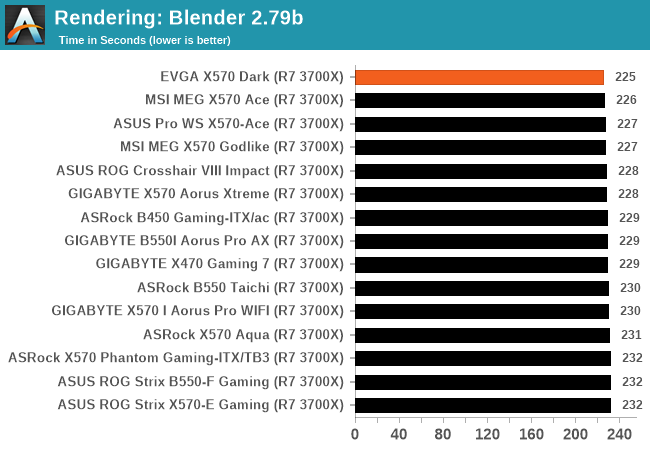
Rendering – POV-Ray 3.7.1: Ray Tracing - link
The Persistence of Vision Ray Tracer, or POV-Ray, is a freeware package for as the name suggests, ray tracing. It is a pure renderer, rather than modeling software, but the latest beta version contains a handy benchmark for stressing all processing threads on a platform. We have been using this test in motherboard reviews to test memory stability at various CPU speeds to good effect – if it passes the test, the IMC in the CPU is stable for a given CPU speed. As a CPU test, it runs for approximately 1-2 minutes on high-end platforms.
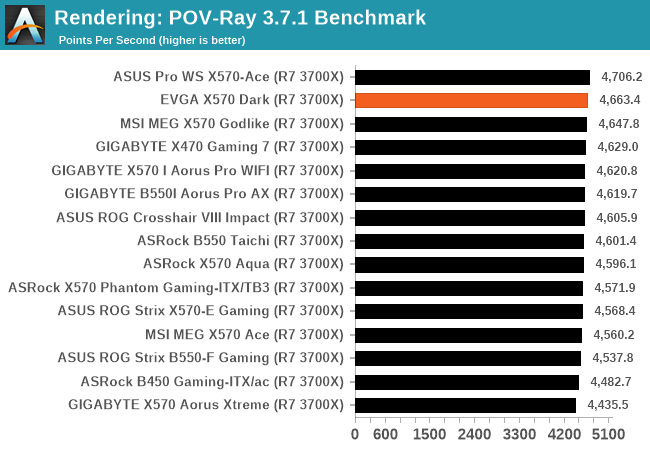
Compression – WinRAR 5.60b3: link
Our WinRAR test from 2013 is updated to the latest version of WinRAR at the start of 2014. We compress a set of 2867 files across 320 folders totaling 1.52 GB in size – 95% of these files are small typical website files, and the rest (90% of the size) are small 30-second 720p videos.
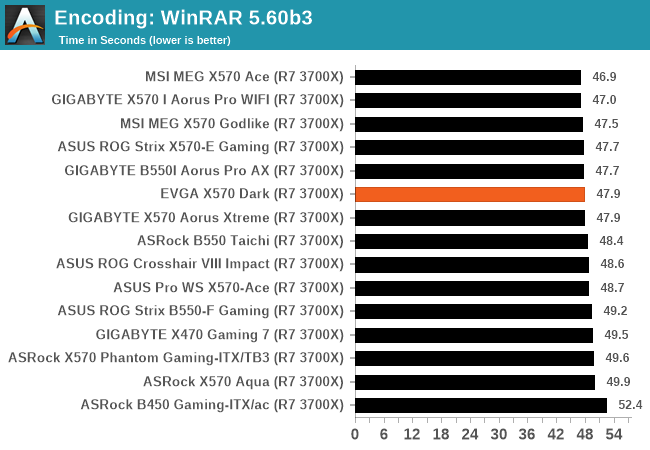
Synthetic – 7-Zip v1805: link
Out of our compression/decompression tool tests, 7-zip is the most requested and comes with a built-in benchmark. For our test suite, we’ve pulled the latest version of the software and we run the benchmark from the command line, reporting the compression, decompression, and a combined score.
It is noted in this benchmark that the latest multi-die processors have very bi-modal performance between compression and decompression, performing well in one and badly in the other. There are also discussions around how the Windows Scheduler is implementing every thread. As we get more results, it will be interesting to see how this plays out.
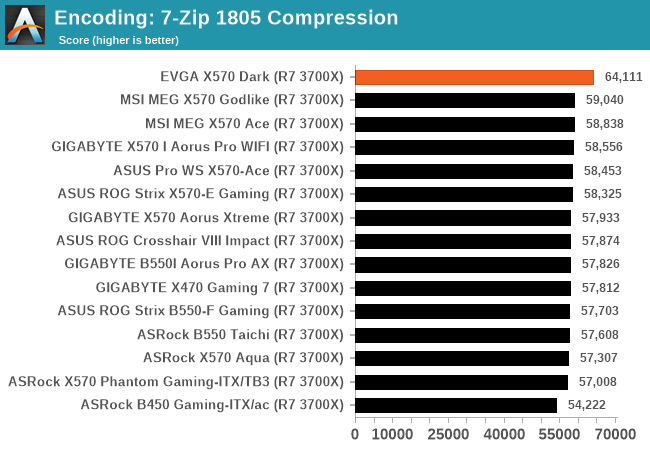
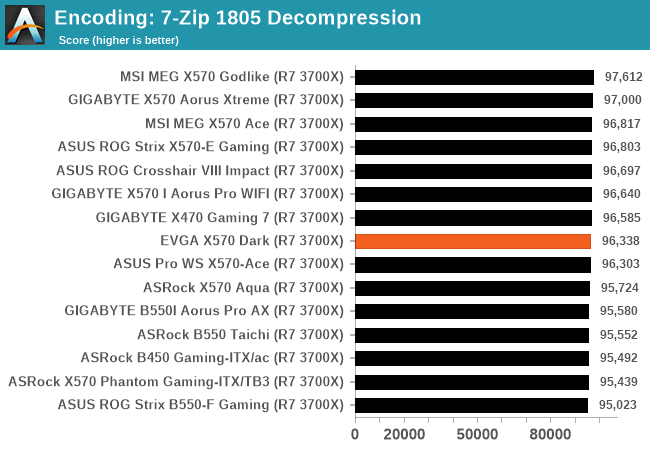
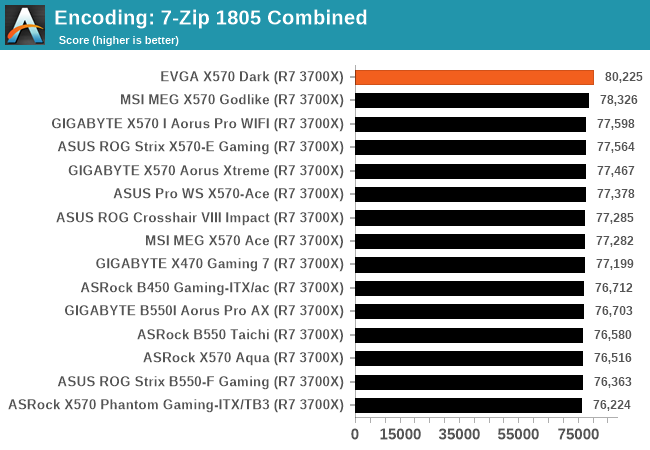
Point Calculations – 3D Movement Algorithm Test: link
3DPM is a self-penned benchmark, taking basic 3D movement algorithms used in Brownian Motion simulations and testing them for speed. High floating point performance, MHz, and IPC win in the single thread version, whereas the multithread version has to handle the threads and loves more cores. For a brief explanation of the platform agnostic coding behind this benchmark, see my forum post here.
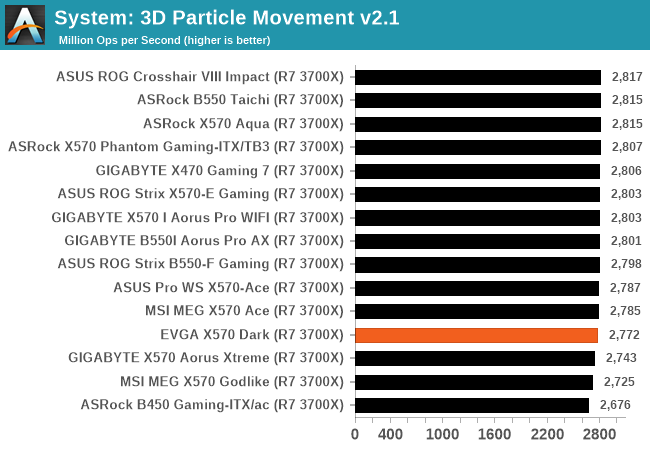










36 Comments
View All Comments
Unashamed_unoriginal_username_x86 - Friday, October 8, 2021 - link
The 7-zip compression lead of 8.5% is very impressive... I think? However, the poor interrupt performance is concerning... Maybe...I'm glad it has 2x2x7 segment displays, that makes a perfect number which bodes well.
either way, this is definitely going to be one of the best clockers out there, so Rolex better 'watch' out. The EVGA® X570 Dark is now my go to recommendation if you really want good, money-no-object 7-Zip performance but you also really like the 3700x.
shabby - Friday, October 8, 2021 - link
$690 board that can only transfer ~250MB/sec over network... pathetic. What's the deal with the slow network cards? Where are the consumer 10gbit routers/switches?shabby - Friday, October 8, 2021 - link
And by consumer i mean affordable.gavbon - Friday, October 8, 2021 - link
The caveat is, extreme overclockers aren't bothered by network transfer speeds. Sure, it would have been better if they did include a 10 GbE controller for argument's sake, but it does nothing for the raw compute performance.Daeros - Saturday, October 9, 2021 - link
Yeah, that argument doesn’t hold. If it was really focused on extreme overclocking it wouldn’t have Wi-Fi.Railgun - Saturday, October 9, 2021 - link
There are plentyQasar - Sunday, October 10, 2021 - link
and they are ? my guess, not known brand names, or ones that are not available everywhere. i just checked one store here, and the least expensive one is $350,and it only has two 10g ports, other 8 are gigabit the next, is a eight 10G SFP+ ports, again at $350 + the cost of the SFP+ modules/transceivers. not really affordable to meshabby - Sunday, October 10, 2021 - link
There aren't any and you know it.Railgun - Wednesday, October 13, 2021 - link
Funny. As I’m using some. Unifi has a couple. Mikrotik has more.Qasar - Saturday, October 16, 2021 - link
yep, not well known brand names that are probably only available in certain, or specific markets....if that is your definition of " plenty " then i dont know what to say.